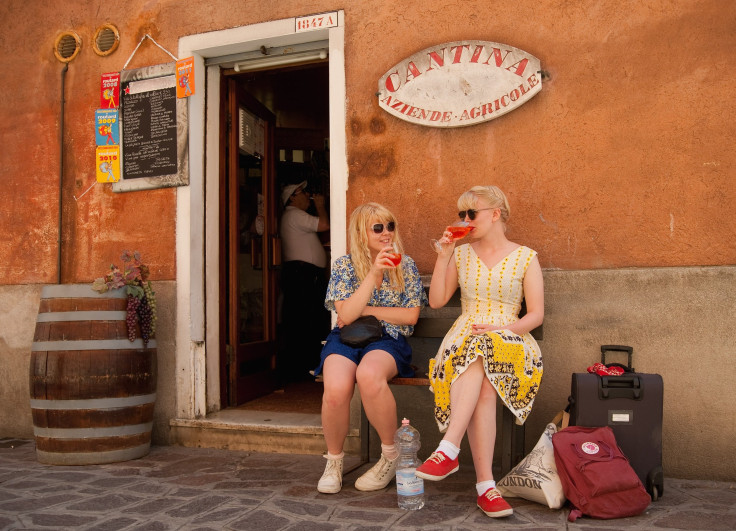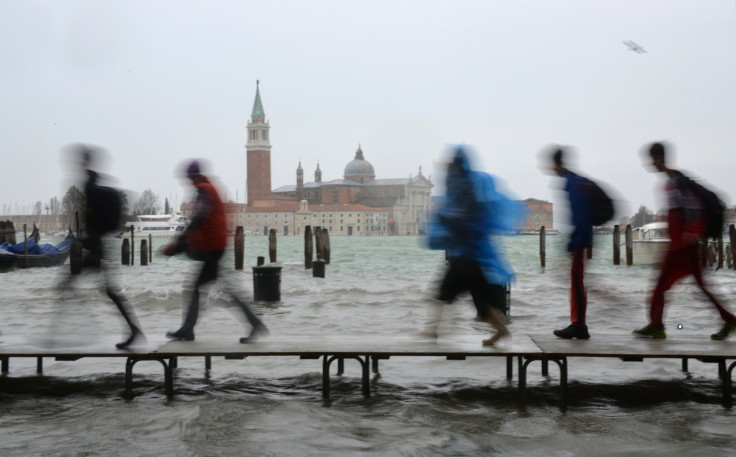Venice Tourism Debate 2015: Residents Fear Visitors Are Destroying Their City, Demand Authorities Crack Down On Cruise Ships

Built on a network of canals and islands, the Italian city of Venice, or Venezia, has been called many things over its long history, such as City of Lovers, Gondola City, Queen of the Adriatic and Serenissima, meaning “The Most Serene.” Because of an influx in recent years of ill-mannered tourists who locals say treat their hometown like an amusement park, however, some want to give it a new name: Veniceland.
“I saw a woman sprawled out on the Rialto Bridge like she was lying in bed,” said Cat Bauer, an American expatriate and writer who has lived in Venice for almost 20 years. Bauer said this kind of behavior is “constant,” adding, “It’s unbelievable what some tourists do.”
Venice welcomes millions of tourists every year, and on any given day in the summer its residents are outnumbered by visitors. With few industrial opportunities existing in the island city, tourism has long been one of its main sources of income. Most of the revenue there is booked through hotels, museums, restaurants and tours. However, as tourists increasingly exhibit bad behavior -- sleeping on bridges, swimming in canals and tagging churches with graffiti -- some Venetians fear the visitors who keep their city alive could also be slowly destroying its culture and history.
Venice’s tourism problem has existed for many years, and it has never been properly addressed by city officials or governmental entities, according to locals. Most Venetians welcome tourists, but they want to see authorities set out strict guidelines to manage their numbers.
“It’s an outdoor museum,” said Celeste Bueno, manager of the ArtViva tours group that encourages tourists to appreciate Venice through private walking tours that delve into the city beyond the guidebooks. “Pretty much everything you see around has some cultural, historical, artistic value. This has become like a Disneyland.”

Exodus From Venice
The permanent population of Venice has been dwindling since the 1960s, in the wake of a 1966 flood that displaced several thousand of its 120,000 residents at the time. Because of various factors such as changes in the property-tax structure and rising canal waters that have forced families to move, the population is now estimated to be fewer than 60,000.
Luxury brands such as Gucci and Versace have also driven away local artisans and mom-and-pop businesses, said Marco Secchi, a professional photographer and native Venetian. Secchi, 52, has lived in the U.K. for many years, although he has family members among the residents who have stayed in the city. “In one area, the shops for the Venetians are gone,” he said. “The butcher, the baker, are closed.”
In the summer especially, tourists run the city, according to locals, who said their daily lives are made extremely difficult due to the sheer number of people jostling for space in Venice’s narrow cobblestone streets.
The accounts of bad behaviors exhibited by tourists, especially “the day trippers,” as locals call them -- people on cruise ships or megabuses who are just checking off Venice on their long lists of European stops -- are lengthy and varied. Visitors have been caught picnicking at holy sites and stealing gondolas for late-night joyrides. And a family was photographed Thursday cooking rice in the middle of the Piazza San Marco, aka St. Mark’s Square.
Trouble In The Town Square
Residents said the rise of cruise ships has been especially bothersome and destructive in Venice, with a 439 percent increase in dockings in the past 15 years. According to residents, this spike has not translated into a visible increase in dollars for the city because these tourists frequently exit the ships with their own tour guides, so they’re often not paying anything for hotels, museums, restaurants or tours. Many simply stampede through the city to take photos of the Doge’s Palace and other famous sites before making their way back to the boat, leaving only trash in their wake.
Portici di Piazza San Marco, a Venezia! Vigili, polizia e carabinieri dov'erano? Sindaco Brugnaro lei cosa fa? pic.twitter.com/Uk2m93QPGk
— Moony Witcher (@Moony_Witcher) August 20, 2015“It’s not that the tourists are bad people,” said Jane Da Mosto, an activist and co-author of the book “The Science of Saving Venice.” She added, “I don’t believe the tourists are bad; Venice has inflicted it on itself in not being intelligent and strategic in managing its tourists.”
Da Mosto was born in the U.K., but married a Venetian and has lived in Venice for 20 years. She became a passionate advocate for her adopted hometown and works actively through research into climate change and tourism issues to preserve the place that she now calls home.

What's Next For Venice?
Venetians insisted they don’t want to discourage tourists from coming, but they do want the city to better manage the number of tourists and regulate their behavior once they are there, even in terms of basic services such as sanitation. “When you have 27 million people walking through the city yearly, you need to have a place for people to put their trash,” said Nan McElroy, a local resident who gives rowing lessons to visitors on Venice’s canals.
Chief among suggestions for cleaning up Venice was better policing of tourists who break the rules. Many Venetians said a great deal of their concerns could be alleviated by stationing local police in a way that would stop visitors from swimming in the canals or sleeping on the bridges. Anna Somers Cocks, 65, a Venice advocate and author of the essay “The Coming Death of Venice,” said even seemingly small things, such as the habit some tourists have of walking around in bikinis during the summer, make Venice feel like a resort, as opposed to a city with a rich history and vibrant community.
“It’s a constant reminder that people don’t think it’s a real city,” Cocks said.
That is going to have to change, residents said, even if it means demanding that their government curtail the number of tourists who visit the city. “No one has said, ‘We are going to have to limit tourists,’” she said. “But it is obvious that it is going to have to come.”
© Copyright IBTimes 2025. All rights reserved.






















